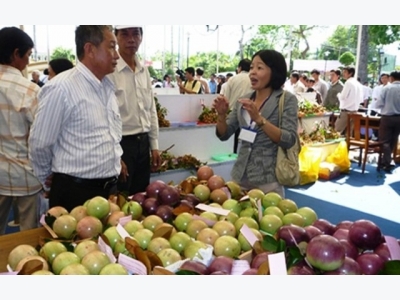Star apples break into US market

Việt Nam’s star-apples can now be exported to the US after nearly 10 years of negotiation. — Photo baocongthuong
HÀ NỘI — Việt Nam has become the first country allowed to export star-apple fruit to the United States. The breakthrough follows 10 years of negotiations.
This follows a report sent by the US Animal and Plant Health Inspection Service (APHIS) to the Việt Nam Ministry of Agriculture and Rural Development’s Plant Protection Department.
The breakthrough was based on the findings of a pest-risk analysis and public reviews and comments that found the fruit could be safely exported into the US.
Together with litchi, longan, rambutan and dragon fruit, star-apples are the fifth Vietnamese fruit allowed into the American market.
The requirements for entry are similar to quarantine for the other fruits, including the growing area. The shipments are subject to inspection upon arrival.
The US requires mandatory pest control for eight pests, mainly fruit flies and aphids.
In addition, the star-apples must meet requirements for the importation of vegetables and fruits into the US market in accordance with the Code of Federal Regulations (CFR)’s Article 319.56-3.
Each batch of fruit must have a plant quarantine certificate issued by Việt Nam Plant Protection Department.
Star-apples are highly valued by US importers for their quality.
Preliminary statistics show that Việt Nam has about 5,000 hectares of star apples, mainly in the Mekong Delta provinces of Tiền Giang (3,100ha) and Cần Thơ (1,200ha).
Fruit productivity is about 18-22 tonnes per hectare. Total annual output is more than 60 thousand tonnes. Until now, most of the fruit has been either eaten locally or exported to China and ASEAN nations.
The successful export of the fruit to the US market opens up great opportunities to develop growing areas
Có thể bạn quan tâm
 Coffee markets stay muted in Vietnam, Indonesia on low supply
Coffee markets stay muted in Vietnam, Indonesia on low supply Asian coffee markets remained subdued this week due to low supplies at the end the crop season in Vietnam
 Ho Chi Minh city retail outlets sell traceable chicken meat, eggs
Ho Chi Minh city retail outlets sell traceable chicken meat, eggs Consumers in HCM City can trace the origin of chicken meat and eggs they buy at both traditional and modern retail outlets starting on October 3.
 Cashew sector a hard nut to crack
Cashew sector a hard nut to crack Unless that obstacle is removed, Việt Nam’s cashew industry will not be able to compete with foreign growers and producers